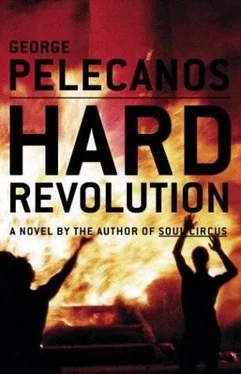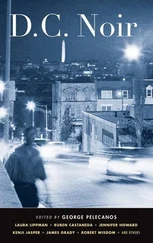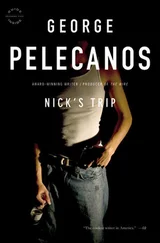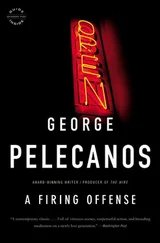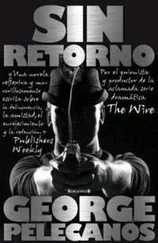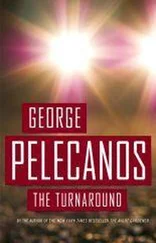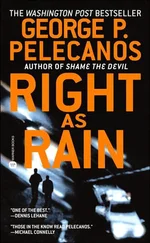Martini parked his Nova on Mississippi, near Stewart’s Belvedere and Hess’s ride. He walked beside a small brick house to a freestanding garage beside a large plot of plow-lined dirt, recently turned. Buzz did this every spring for his mother; he had done it even when the old man was alive. Albert Stewart had kicked from throat cancer while Buzz was overseas.
Stewart and Hess were in the garage, standing around Stewart’s bike, an old Triumph Bonneville with twenty-four-inch risers. Both were smoking ’Boros and drinking Schlitz out of cans. Both wore Levi’s jeans and motorcycle boots. A radio sat on a shelf under an old Esso sign, taken from the station. “7 Rooms of Gloom” came from its speaker.
A droplight had been looped through the rafters and hung over the two men. It cast yellow light upon their pale faces.
Hess threw his head back to kill his beer. He crushed the can in his fist and tossed it into a trash can, half filled with empties, in the corner of the garage. Martini stepped inside.
He said, “Buzz,” then nodded at Hess.
“Pretty boy,” said Hess.
“Shorty,” said Martini.
“Drop that door,” said Stewart.
Martini pulled the garage door down to the cement floor. Hess found another can of beer and pulled its ring. He dropped the ring into the opening at the top of the can.
Stewart head-motioned Martini toward a workbench set against one of the cinder-block walls. “Check this out.”
Martini followed Stewart to a corner of the bench. Stewart pulled back a tarp covering a lumpen shape. A double-barreled, double-triggered, Italian-made shotgun was set tight in a vise. The barrel and stock had been cut down. A hacksaw lay nearby in a thick film of metal shavings.
Martini hadn’t held a gun since he’d turned in his rifle. He had no desire to touch one again.
“Whaddaya think?”
“It’s gotta be fifty years old. A bird shooter.” Martini could think of nothing else to say.
“It makes its point. A man stares down two barrels of anything, he’s gonna give up whatever it is you askin’ for.” Stewart dragged on his smoke. “Go on, take it out the vise and get a feel for it.”
“I don’t want to,” said Martini.
“I don’t want to,” said Hess in a girlish way.
“Shut up, Shorty,” said Stewart.
“What,” said Hess, “you gonna let him pussy out on us now?”
Martini shook his head. “That’s not what I’m sayin’.”
“What, then?” said Stewart.
“Told you once before. I don’t want to see nobody hurt.”
“Shit,” said Hess, “you didn’t have no problem with greasin’ them pieheads over there, did ya?”
Martini kept his eyes on Stewart. “All I’m tryin’ to say is, I ain’t up for no blood.”
“You don’t have nothin’ against getting rich, though, do you?” said Stewart.
“Course not.”
“Well, you don’t have to worry, then,” said Stewart. “The cut-down’s for me. All you gotta do is drive. Three equal shares, like I promised. Course, you will have to carry a gun, just in case. All for one. But there won’t be no need to use it.”
“When?” said Martini.
“Soon.”
Stewart studied Martini. Martini lowered his eyes.
Hess hit his smoke down to the filter and crushed it under his boot. He looked at the radio on the shelf with something like hate. “Buzz?”
“What?”
“What the fuck is this rughead singin’ about, anyway?”
Stewart turned to Hess. “That’s Levi Stubbs, you dumb shit.”
“So?”
“So it shows what you don’t know.”
“Thought we was gonna do some sportin’ tonight. I ain’t come here to listen to no songs.”
Stewart said, “Let’s go.”
Martini grabbed a can of Schlitz and popped it. Hess casually took a pill from his pocket, popped it in his mouth, and washed it down with beer. Stewart found a small black case in a footlocker, set the case on the workbench, and opened its lid. He extracted his derringer, an American single-shot stainless.38 with rosewood grips, from its place in the red velvet lining. He put one foot up on a stool and slipped the derringer into his boot.
“I’ll meet you guys out front,” said Stewart. “I gotta say good-bye to my mom.”
“WHERE YOUR GIRL at, Alvin?” said Kenneth Willis.
“Back there fuckin’ with that kid.”
“Must not have been back there all day, though.”
“Why you say that?”
“It smells like Charlie the Tuna been swimmin’ through here, cuz.”
“Yeah, well, you know.”
Alvin Jones and Kenneth Willis laughed and touched hands.
Jones sat on a big cushioned chair. He had the smell of whiskey on him but had not offered any kind of refreshment to Willis or Dennis Strange. Both were standing in the cramped living room of Lula Bacon’s apartment.
Dennis looked down at Jones, compact, freckled, with a yellow color to his skin. Wearing a gold Ban-Lon shirt with wide vertical black stripes, black slacks, and hard shoes of imitation-reptile tooled leather. Dennis could see his socks, sheer, almost, except for the solid parallel lines running through them. The slick brothers called these Thick ’n Thins. This was one slick man right here.
“What you lookin’ at, boy?” said Jones. His eyes were golden, the same color as his shirt.
“Nothin’,” said Dennis.
“Oh, you lookin’, all right. Always lookin’. You into the details of everything, I can tell. Got this outfit at Cavalier, on Seventh, case you wonderin’.” Jones wiggled one foot. “I can see you diggin’ on my gators, too. Saw ’em in the window of Flagg Brothers. Wouldn’t buy my shoes anyplace else.”
Those aren’t real gators, thought Dennis. And you ain’t shit.
“I’ll take you down to F Street with me next time; we can hook you up with a pair, too,” said Jones, going on despite the fact that Dennis had not replied. “Get you out of them Kinneys you wearin’.”
“I don’t need you to pick out my shoes.”
Jones laughed. “Well, you damn sure look like you could use some one’s help.”
“Why we listenin’ to the news?” said Willis, who had gone to the stereo and was reaching for the tuner dial.
“Don’t touch that,” said Jones.
“I was gonna move it over to OL,” said Willis. “All’s they doin’ is talkin’.”
“Uh-uh, man, leave it on OOK. That’s me right there.”
“They both the same.”
“K comes before L,” said Jones. “Don’t you know that?”
Willis looked at him, openmouthed, and stepped back from the unit. “Say, man, what you fixin’ to play tomorrow?”
“Well, I got a problem with that,” said Jones. “I was picking Frank Howard for the first number, but Howard plays left. Ain’t no base you can draw it from…”
“Seven,” said Dennis Strange.
“Say what?”
“Left is the seventh position on the field. It’s what the stats man uses when he’s making a mark in his book.”
Jones winked. “Damn, boy, you smart. All them books you be readin’ must be sinkin’ in.”
“Just tryin’ to help.”
“Nah, you a smart one, I can tell.” Jones showed Dennis Strange his teeth. “A de tail man.”
Dennis knew Alvin Jones from nine years back, through Kenneth, but it seemed he had always known his kind. Jones had that crocodile smile and those cut-you-for-nothin’ eyes that Dennis had seen on certain neighborhood crawlers his whole life. Dennis had returned from the navy determined not to hang with these types, who perpetrated violent shit against their own people and treated their women like dogs. It was Willis, stupid and not as slick, but just as willing to do low things, who had put them all back together. And here was Dennis, selling reefer for a Park View dealer, taking government disability, high during the daytime, having no job. Just like them. Dennis’s father called them no-accounts. Now he was one, too.
Читать дальше
